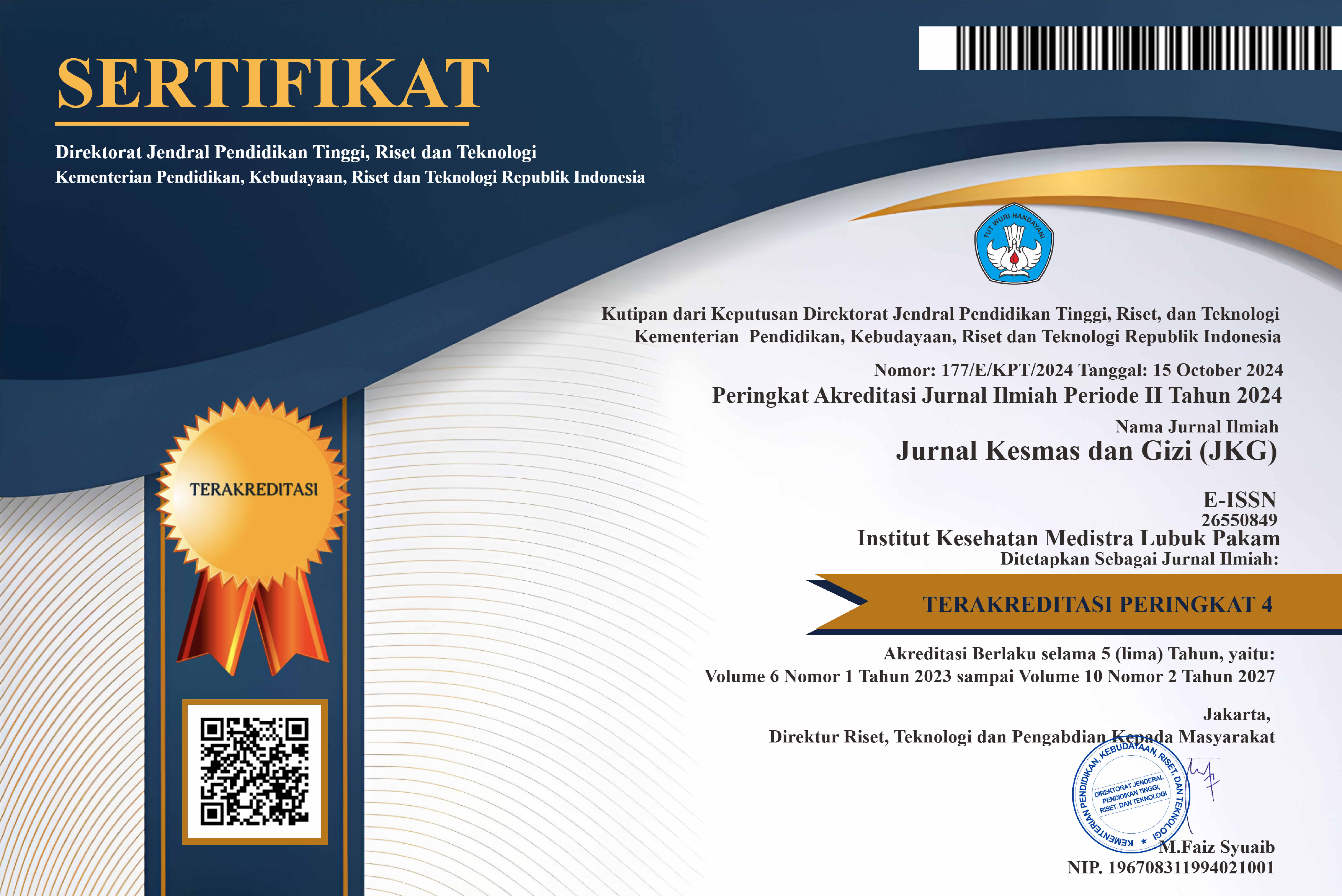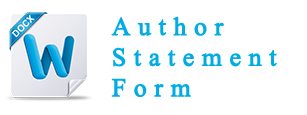Factors Affecting the Quality of Medical Record Services
DOI:
https://doi.org/10.35451/bz7sps52Keywords:
Medical Records, Service Quality, Knowledge, Workload, FacilitiesAbstract
Background: Medical records play a crucial role in supporting safe, high-quality, and continuous healthcare services. However, the quality of medical record services at many healthcare facilities, including Granmed Hospital Lubuk Pakam, still faces various challenges.Objective:This study aims to analyze the factors affecting the quality of medical record services, including individual factors (knowledge, perception, workload), organizational factors (policies, training, supervision), and technological factors (facilities and infrastructure). Research Methods: A quantitative analytic observational study with a cross-sectional design was conducted. A total of 75 healthcare and administrative workers involved in medical record management were selected using total sampling. Data were collected through structured questionnaires and medical record audits, then analyzed using chi-square tests and multiple logistic regression. Results: There were significant relationships between knowledge (p=0.002), workload (p=0.015), training and supervision (p=0.049), and availability of facilities and infrastructure (p=0.022) with the quality of medical record services. Most respondents reported a heavy workload and inadequate facilities.Conclusion:Knowledge, workload, training-supervision, and facility availability significantly influence the quality of medical record services. Efforts to strengthen human resources, manage workloads better, enhance supervision, and improve infrastructure are essential to enhance the quality of medical record documentation.
Downloads
References
Haux R. Medical informatics: Past, present, future. Int J Med Inform. 2010;79(9):599–610.
Stanfill MH, Marc DT. Health information management: Implications of electronic health record data for health information management professionals. Perspect Health Inf Manag. 2019;16:1c.
Wachter RM. The Digital Doctor: Hope, Hype, and Harm at the Dawn of Medicine’s Computer Age. New York: McGraw-Hill; 2015.
World Health Organization. Patient Safety: Making health care safer. Geneva: WHO; 2017.
Endriyas M, Kawza A, Alano A, Lemango F. Quality of medical records in public health facilities: A case of Southern Ethiopia, resource-limited setting. Health Inform J. 2022;28(1):14604582221112853.
Olatunji RO, Adebayo AM, Adepoju FG, et al. Data quality assessment in healthcare: A 365-day chart review of inpatients' health records at a Nigerian tertiary hospital. Perspect Health Inf Manag. 2012;9:1c.
Saber Tehrani AS, Lee H, Mathews SC, Shore A, Makary MA. 25-Year summary of US malpractice claims for diagnostic errors 1986–2010: An analysis from the National Practitioner Data Bank. BMJ Qual Saf. 2013;22(8):672–680.
Indonesia Ministry of Health. Regulation No. 269 of 2008 concerning Medical Records. Jakarta: Ministry of Health; 2008.
Ismawati NDS, Supriyanto S, Haksama S, Hadi C. The influence of knowledge and perceptions of doctors on the quality of medical records. J Public Health Res. 2021;10(2):2228.
Arrandhikasari D, Pamungkas RA, Saptaningsih AB. The influence of workload, knowledge, motivation on medical record quality through doctor compliance. Int J Nurs Health Serv. 2021;4(3):475–483.
Meeks DW, Smith MW, Taylor L, Sittig DF, Scott JM, Singh H. An analysis of electronic health record-related patient safety concerns. J Am Med Inform Assoc. 2014;21(6):1053–1059.
Setiowati, T. (2021). Pengaruh Pengetahuan Tenaga Kesehatan terhadap Kualitas Rekam Medis. Jurnal Administrasi Rumah Sakit, 7(2), 123-131.
Sari, R. P., dkk. (2020). Hubungan Tingkat Pengetahuan dengan Kualitas Pengisian Rekam Medis. Jurnal Manajemen Informasi Kesehatan Indonesia, 8(1), 45-53.
Kementerian Kesehatan RI. (2019). Standar Pengelolaan Rekam Medis di Rumah Sakit. Jakarta: Kemenkes RI.
Sari, Y., Ahmad, M., & Prasetyo, D. (2020). Pengaruh Pelatihan terhadap Kualitas Pelayanan Rekam Medis. Jurnal Kesehatan Masyarakat, 12(3), 211-218.
Lestari, A. (2023). Beban Kerja dan Dampaknya terhadap Kinerja Tenaga Kesehatan. Jurnal Kesehatan Global, 5(2), 66-74.
Robbins, S. P., & Judge, T. A. (2017). Organizational Behavior. 17th Edition. Pearson Education.
Karasek, R. (1979). Job Demands, Job Decision Latitude, and Mental Strain: Implications for Job Redesign. Administrative Science Quarterly, 24(2), 285-308.
Yuliana, S., dkk. (2022). Hubungan Beban Kerja dengan Kualitas Rekam Medis di RSUD. Jurnal Ilmu Kesehatan, 13(1), 87-95.
Handayani, P. W. (2021). Supervisi dalam Manajemen Pelayanan Rekam Medis. Jurnal Administrasi Kesehatan, 9(2), 101-109.
Kolb, D. A. (1984). Experiential Learning: Experience as the Source of Learning and Development. Prentice Hall.
Lestari, E. (2023). Pengaruh Pelatihan terhadap Kinerja Petugas Rekam Medis. Jurnal Manajemen Kesehatan Indonesia, 11(2), 34-40.
Pratama, B., dkk. (2022). Pengaruh Ketersediaan Sarana Prasarana terhadap Kualitas Pelayanan Rekam Medis. Jurnal Sistem Informasi Kesehatan, 7(1), 55-63.
WHO. (2019). Guidelines on Health Information Systems. Geneva: World Health Organization.
Pratama, B., Susanti, D., & Nugroho, T. (2022). Impact of Infrastructure Availability on Medical Record Services. Journal of Health Information Management, 15(2), 145-152.
Goetsch, D. L., & Davis, S. B. (2016). Quality Management for Organizational Excellence. 8th Edition. Pearson Education.
Downloads
Published
Issue
Section
License
Copyright (c) 2025 Felix Kasim

This work is licensed under a Creative Commons Attribution 4.0 International License.
Copyright in each article is the property of the Author.



























